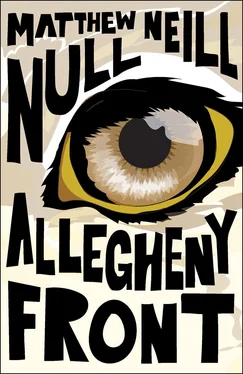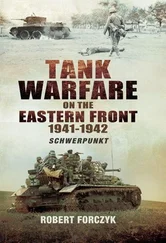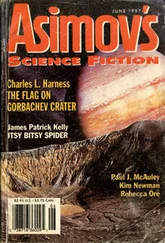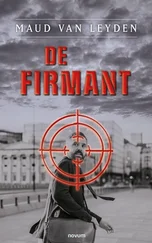“Want me to fetch it?” Though he knew crows would be playing rowdy by now.
She shaded her face, her pretty gray eyes. “No, no. It’s alright.”
“I want to,” he said, coloring. He was angry at himself, and angry at her. “I’ll run up.”
“Too late anyhow.”
“You want me to shoot another?”
“No. Well, maybe later this year. I’d hate to have one killed just for the liver.”
“We’ll get us one when the twins come. Here, come take a look at this old boy.”
The eagle was huge. Marion put a tentative finger to the claws. A train of blood eased down the whitewashed boards, the fierce yellow gleam draining from its iris. Sull and Marion heard a shrill cry breaking in two parts, then three. The eagle’s mate was banking to the clouds above Fenwick Mountain. As she climbed updrafts on stiff wingbeats, the circle she made grew and grew, expanding like a pupil to the shifting of light.
Eric couldn’t come home. “They’re only allowed a furlough if a close relative dies,” the warden had told them. “That’s state policy. Mother, father, brother, sister, son, or daughter, God forbid. Guard escorts them the morning of the funeral and brings them back that afternoon. I can tell you’re good church kind of people and I hate telling it to you, but it’s true.”
In the first riot, the warden turned off power and water for ten days. When light shined again, the prisoners were made to carry dead men to the corner of the yard. It was three hundred fifty-two and a half feet long, eighty-two and a half feet wide, and Sull’s son knew every inch. Eric’s crew buried four unclaimed men with crosshairs chasing them like horseflies, rifles leaning from gothic battlements.
Yet Sull had things to give thanks for. Carter and Reed McCulloch would soon come for buck season, taking the same stands they did every year. The hollow where he shot the doe was only half a mile from his house. A low ridge off Fenwick Mountain, footed there like a foal to its mare. Coastal Timber owned the thousand-acre tract, letting oaks grow upward to the saw, but Sull knew the land better than any company surveyor. He’d learned the place from his father and Uncle Aubrey, memorizing trees as one does a prayer book. Despite the yellow POSTED signs, no one meddled with him there, at least not for now, though he did come across others, like the young grouse-hunter working his brace of bird dogs like a currycomb through the rough pelt of mountainside. What could he say? Was it his place to run people off? He feared others. On a whim, they could take the place away from him, make it theirs. There would be no room for him, or those like him.
Marion reminded him of the McCullochs’ visit at supper, after they had speculated on the habits of eagles. Sull Mercer and snaggletoothed Carter McCulloch sprung from the same tintype great-grandmother, a mad seamstress from Anthem who wore a celluloid visor against the sun and a human molar set in a ring — she said it belonged to the jawbone of Thomas Jefferson. Beyond blood, Carter was Sull’s best and oldest friend. In their youth, they had been the most talented poachers of their generation, jacklighting bucks, exploding trout streams with bottles of carbolic acid and netting the astonished catch as they bobbed to the surface, air bladders ruptured. One Veterans Day they creeled 123 native brook trout from Whitehorse Run. The legal limit was six. Fried them popping with ramps and potatoes and ate them from the skillet like smelt, bone and eye and all, till the boys passed out gorged and greasy round the fire-ring. Half the fish they left for raccoons to have a holiday. Sull always laughed to his wife how goofy it was Carter grew up to be a game warden. What’s writ for you in the Book of Life, you never know.
“Yes, the McCullochs are good people,” Sull told her, “but they’re not sons, they’re not blood in that sort of way.” Marion said it was too bad their own boys couldn’t find good jobs around here like Reed did, or Carter did before him.
Sull and Marion argued after that. But he did remember to make a promised phone call.
Reed McCulloch, Carter’s boy, coasted into the drive the next morning in his dime-bright Chevy. He was a young lawyer, and all the country people did business through him. When Eric got in trouble, Reed had found the Mercers a fine criminal lawyer, though it did them no good. No one could have talked judge and jury out of a Moundsville sentence for their son.
Sull was welding a broken bed-frame for the boy. He wondered how the hell you could break a thing like that, but when Reed’s fiancée climbed out of the truck, he had a pretty good notion. “Hey there, who’s this good-looking woman you brung me?”
Reed grinned. “Miranda, this is Uncle Sull. He’s the last of the mountaineers.”
“Pleasure to meet you,” she said, tipping her face to Sull in a way that made him embarrassed for the green crescents of his fingernails, the licks of uncombed hair curling out from under his oil-stained cap. She came from Marshall County, where the penitentiary was, and her voice was like a Yankee’s, crisp and clipped.
Sull decided not to offer his hand. He gave her a little wave. “Pleased to meet you, miss.” Sull turned to Reed. “How much you paying her?”
She cuffed Sull’s arm and laughed. Fretful hens were milling by their feet.
Reed said, “I’m paying with a new house, by all accounts. We closed on some acreage near the gorge yesterday. Just a speck by the National Forest.”
“Oh yeah? How many acres?”
Reed looked away, to the broken quartzite peak of Fenwick Mountain. The other eagle, maybe? Instinctively, Sull followed his gaze. The mountain still held snow, which had melted off in the valley. Reed tucked his tongue into a cheek. “Three hundred and forty,” he said.
“That’s more than a speck, that’s awful goodly land. Know how little I got here?”
“I’ve hunted every inch of it.” Reed was referring to the Coastal Timber property.
Sull winked at Miranda. “Don’t be too impressed. That’s a bad habit of his, exaggeration. Not so many inches in this place as he’d lead you to believe. He ever tell you a thing like that?”
She blushed. “Don’t mind me,” Sull told her. “Old men just talks like that.”
Reed laughed. “I’d like for you to see the place. Maybe Dad can bring you out.”
“We’ll do it. I haven’t seen him out and about lately.”
“We’re stopping by Mom’s on the way home. I’ll tell him to come see you.”
“Suppose you want that bed-frame.”
“Here, I’ll help you.”
While they carried the frame from the shop, Marion stepped out to meet Miranda. When the women weren’t looking, Reed slipped his father’s friend a folded twenty-dollar bill. Sull tucked it into his watchpocket. Reed asked, “Are the twins hunting with us this year?”
“’Deed I don’t know. Say it depends on their vacation. Joel had him a baby this spring.”
“I hope they come. It’s been a couple years.”
“GM works them pretty hard up there.”
Marion was giving Miranda an apron full of late apples that shined as if they’d been lacquered. Side-by-side, the pair struck Sull about as unalike as women can be, though he knew it wasn’t fair to think that way. One night he and Marion heard Eric talking on the phone in the living room when he came home drunk. “If that redneck slut looks at me like that one more time, I’ll put her eyes out. I swear to God, I’ll do it with my own hands.” Eric was talking about his girlfriend. They’d never heard him so much as cuss. In the twilight of their room, Sull felt Marion’s body stiffen then shiver beside him, but she said nothing.
As he walked with Reed McCulloch, who would Marion compare him to?
Читать дальше












